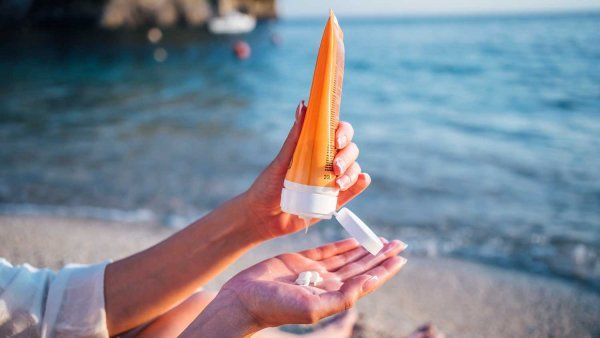
Which Skin Care Products Do We Really Need?
Skin care is big business – just ask the multibillion-dollar beauty industry. But does it truly take a cabinet full of pricey products to keep our skin healthy?
Animation: Farah Hamade
From cleansers to creams and serums to sunscreens, the skin care aisle is bursting with products that promise to make our skin look brighter, softer, younger, better. But which products are must-haves, and which are unnecessary? Should you shell out extra cash for “clean” cosmetics? And is sunscreen really that important?
We asked a trio of UCSF dermatologists our burning questions about skin care to find out which products should earn a spot on our shopping lists.
Myth #1
I need to follow a complex – and expensive – skin care routine to keep my skin healthy as I age.
Actually, a simple drugstore moisturizer is the most important product, aside from sun protection, in your anti-aging skin care routine, says Katrina Abuabara, MD, an associate professor of dermatology at UCSF with an interest in eczema. Moisturizer helps protect the skin barrier, a pivotal function of our body’s largest organ.
As we get older and the immune cells in our skin amass more exposure to toxins, allergens, and pollutants, our skin’s ability to function as a barrier declines, Abuabara says. This can cause low-grade skin inflammation, with symptoms including redness and dryness. Inflamed immune cells from the skin may spread throughout the body, causing systemic inflammation, which can lead to a host of serious health problems.
For instance, patients with moderate to severe eczema, a skin condition characterized by a red and itchy rash, have higher rates of cardiovascular disease. Last year, Abuabara was the lead author of a study showing that adult patients with eczema have a 27% increased risk of dementia.
For older adults and those with dry skin, one of the best ways to prevent skin inflammation is to apply moisturizer. Experts at UCSF and elsewhere are studying whether moisturizer use could actually ease inflammation-related problems beyond the skin. Peter Elias, MD ’67, UCSF dermatology professor emeritus, found that applying Vaseline petroleum jelly to mice reduced the levels of inflammation in their blood. A small study by Elias and other researchers suggested the same might be true of humans.
“I don’t think we’re going to cure dementia with Vaseline,” Abuabara says. “But putting moisturizer on older adults may help as part of a general strategy – and it’s so low cost and easy and safe that it is something people could consider as part of elder care.”
So, using moisturizer is a good idea, but how does one choose from the countless products available? The products with the most moisturizing power are ointments like Vaseline and oils, Abuabara says. Creams are the next most moisturizing, then lotions and gels. “It just depends on how dry you are and what type of product you prefer,” she says. “Everyone’s a little different.”
Myth #2
If I wear sunscreen all the time, I won’t get the vitamin D that I need.
While it’s true that 90% of our vitamin D comes from sun exposure, that’s hardly a get-out-of-jail-free card when it comes to sun protection, says Lindy Fox, MD, a UCSF professor of dermatology who cares for hospitalized patients with complex skin conditions. Even with a sunscreen routine, most healthy people get enough unintended sun exposure that they don’t need a vitamin D supplement.
Experimental research – studies with a control group and an experimental group – has shown that using sunscreen reduces vitamin D absorption, Fox says. But observational studies – in which researchers observe what participants do naturally – indicate that sun protection doesn’t cause people’s vitamin D levels to drop.
That might be because most people don’t use enough sunscreen. One ounce – about the size of a shot glass – is the amount of sunscreen required to cover the entire body once, Fox says. And if you’re swimming and sweating, you should reapply sunscreen every two hours. That means a typical adult on a beach vacation should use up an entire three-ounce bottle of sunscreen in a single day.
Even if you spend most of the day inside, UVA rays penetrate your home, office, and car windows unless a UVA-specific blocker has been added to the glass.
Unprotected sun exposure is a known risk factor for skin cancer, so Fox says sun protection is a must for everyone. “You should be using sunscreen every day, just like you brush your teeth,” she says. “Sunscreen should go on sun-exposed areas, including, for ultimate sun protection, your face, your chest, your hands, your arms.” (And don’t forget to reapply it before a lunchtime walk.)
Supplementing a sunscreen routine with sun-protective clothing, such as rash guards and wide-brimmed hats, is also a good idea.
Myth #3
My dark skin protects me from skin cancer, so I can skip sunscreen.
Sorry, but people with darker skin tones still need sun protection – though perhaps not for the same reasons as those with lighter skin, says assistant professor of dermatology Jenna Lester, MD, who directs UCSF’s Skin of Color Program.
It’s true that melanin, a natural pigment that gives color to skin and is more abundant in darker-skinned people, is protective against skin cancer, Lester says. That’s probably why melanoma is less common in people with darker skin, though it is more deadly in those who are diagnosed with it.
Based on what dermatologists know today, sunscreen use does not prevent melanoma in Black patients. But focusing sun protection education largely on skin cancer prevention ignores the reasons why people of color should wear sunscreen, Lester says. “We center the concerns of white patients in the dermatology experience,” she says. “We don’t really talk about sunscreen as much when we’re talking about discoloration or uneven skin tone or the visible signs of sun damage in someone with dark skin.”
Regular sunscreen use can help prevent a host of pigmentary disorders, including melasma, a condition in which darker patches or spots appear on the face.
People with darker skin are less likely to develop wrinkles caused by sun exposure, Lester says, but they can develop an uneven skin tone. “A daily sunscreen practice can help prevent that from ever being a problem,” she says.
Myth #4
“Clean,” “natural,” or organic skin care products are better.
Nope. In fact, products touted as “clean,” “natural,” or organic are often worse for the skin. “People use products they think are better because they’re called ‘clean,’” Fox says. “They end up coming to us with sick skin full of rashes, allergies, and other problems.”
The ingredients in these products tend not to be well studied, Fox says. And cosmetics don’t have to be approved by the U.S. Food and Drug Administration before being sold. “The problem with the clean beauty movement,” she says, “is that there’s no definition of ‘clean.’”
Here’s how this dermatologist defines a good skin care product: It contains ingredients that are good for the skin, that have scientifically proven efficacy, and that won’t cause allergies or irritations. Some of these include retinoids for anti-aging, niacinamide for hydrating and restoring the skin barrier, ceramides for locking in moisture, and squalane, a skin softener that improves elasticity and reduces visible signs of aging.




